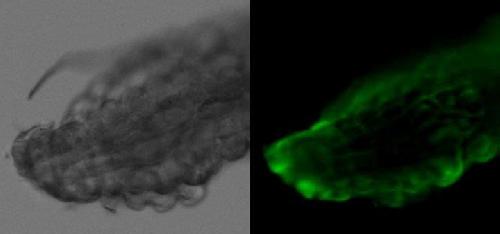There is currently no approved specific treatment or vaccine for dengue fever, and an estimated 2 billion people are at risk for being bitten by Aedes mosquitoes and infected with the dengue virus (DENV). A study published on October 22nd in PLOS Pathogens introduces a candidate target for a transmission-blocking vaccine that interferes with virus infection of the mosquito after it feeds on the blood of infected hosts (such a vaccine would be a valuable complement to traditional DENV vaccines in development that seek to prevent human infection).
Tonya Colpitts, from the University of South Carolina School of Medicine in Columbia, USA, Michael Conway, from the Central Michigan University College of Medicine in Mt Pleasant, USA, and colleagues study mosquito genes up-regulated during DENV infection as some of them are likely required for virus survival or infection. Having previously identified a number of such genes, they here focused on one of them--which they termed CRVP379--that codes for a putative cysteine-rich venom protein.
The researchers report that CRVP379 is required during DENV infection in mosquito cells and in live mosquitoes, and that there is a direct correlation between the amount of CRVP379 expressed in the mosquito gut (where infection initiates) and the level of DENV infection in the gut and in whole mosquitoes.
 The left panel shows the midgut morphology in bright field light microscopy. The right panel highlights the regions that CRVP379 antibodies bound on dissected Aedes aegypti midguts, which are stained green using a secondary FITC antibody and imaged using fluorescent microscopy. Credit: Colpitts et al., CC-BY
The left panel shows the midgut morphology in bright field light microscopy. The right panel highlights the regions that CRVP379 antibodies bound on dissected Aedes aegypti midguts, which are stained green using a secondary FITC antibody and imaged using fluorescent microscopy. Credit: Colpitts et al., CC-BY
They go on to show that CRVP379 interacts with a protein called prohibitin that is a putative DENV receptor in mosquitoes. When the researchers fed Aedes mosquitoes antibodies able to recognize CRVP379, potentially blocking the interaction of the protein with either DENV or prohibitin, they found that this inhibits DENV infection of the mosquitoes.
"These results further our understanding of DENV pathogenesis in the mosquito vector", the researchers say, "and highlight a potential target protein for the creation of a DENV transmission-blocking vaccine to break the host-vector transmission cycle".
Discussing further the suitability of CRVP379 as a potential vaccine target, the researchers note that the protein lacks similarities to human proteins (which when present could lead to undesired auto-immune reactions against a potential human vaccine), and that it is also upregulated when mosquitoes are infected with two related viruses, West Nile virus and Yellow Fever virus, and hence might be useful in blocking transmission of these viruses as well.
Moreover, they have been able to detect antibodies against CRVP379 in human blood samples, demonstrating that the protein is able to elicit an immune response in humans. They are currently investigating whether levels of these antibodies correlate with protection against DENV infection and disease severity upon infection.
source: PLOS